Table of Contents
- What is Whey Protein Isolate?
- Benefits of Whey Protein Isolate
- Understanding Calories per Scoop
- How to Incorporate Whey Protein Isolate
- Whey Protein Isolate vs. Whey Protein Concentrate
- Common Myths and Misconceptions
- Choosing the Right Whey Protein Isolate
What is Whey Protein Isolate?
Whey protein isolate is a type of protein powder that has been processed to remove most of the lactose, fat, and carbohydrates found in regular whey protein concentrate. It contains a high percentage of protein and is popular among fitness enthusiasts for its rapid absorption and muscle-building properties.
Benefits of Whey Protein Isolate
Discover the numerous benefits of consuming whey protein isolate, such as aiding in muscle recovery, supporting weight loss, and boosting immune function. This section will explore how this supplement can enhance your fitness journey.
Whey protein isolate is a popular supplement that offers numerous benefits to individuals looking to enhance their fitness and improve their overall health. One significant advantage of whey protein isolate is its low calorie content per scoop.
Whey protein isolate typically contains around 100-120 calories per scoop, making it an ideal choice for those who are calorie-conscious or aiming to maintain or lose weight while still meeting their protein needs.
Here are some of the benefits of whey protein isolate:
- High Protein Content: Whey protein isolate is a concentrated source of protein, containing about 90-95% protein by weight. This makes it an efficient way to meet your daily protein requirements and support muscle growth and recovery.
- Complete Amino Acid Profile: It contains all nine essential amino acids that the body needs but cannot produce on its own. These amino acids are crucial for various functions, including building and repairing tissues, producing enzymes and hormones, and supporting the immune system.
- Fast Absorption and Digestion: Whey protein isolate is rapidly absorbed and digested by the body, making it an excellent post-workout supplement. It quickly delivers essential amino acids to the muscles, helping with muscle repair and growth.
- Low Lactose Content: Whey protein isolate undergoes an extra filtration process that removes most of the lactose, making it a suitable option for individuals with lactose intolerance or sensitivity.
- Rich in BCAAs: Branched-Chain Amino Acids (BCAAs) found in whey protein isolate, such as leucine, isoleucine, and valine, play a vital role in muscle protein synthesis and can enhance exercise performance and recovery.
In conclusion, whey protein isolate not only provides a high-quality protein source but also offers numerous benefits such as low calorie content per scoop, complete amino acid profile, fast absorption, and low lactose content. Incorporating whey protein isolate into your diet can help support your fitness goals and overall well-being.
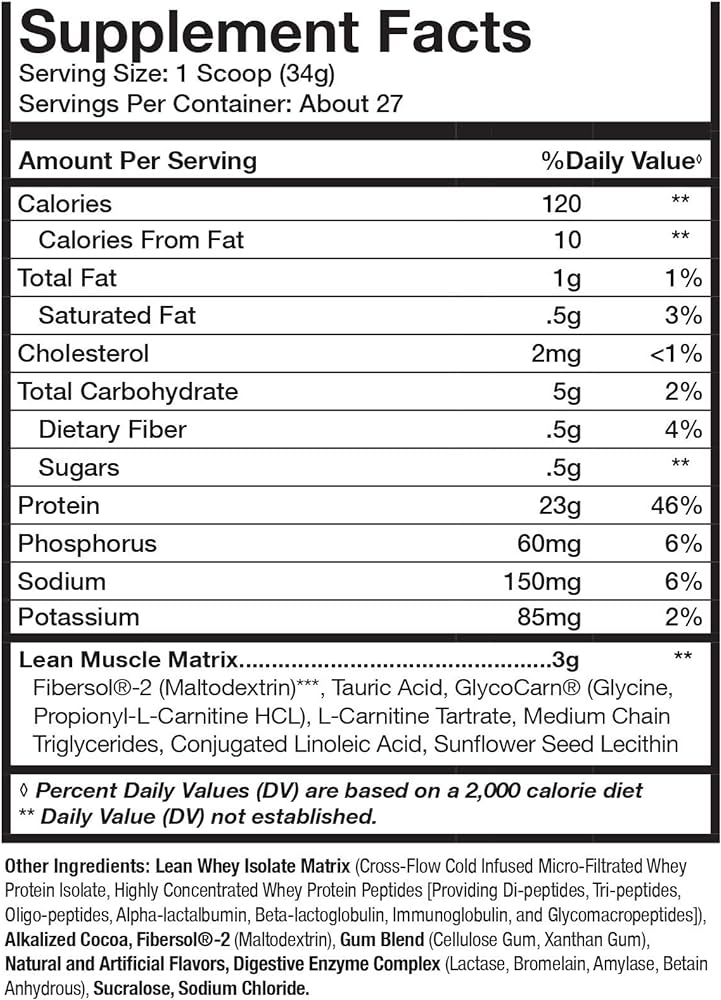
Understanding Calories per Scoop
Learn about the calories per scoop in whey protein isolate and how they contribute to your daily nutritional intake. Find out how to calculate the calorie content and make informed choices based on your health and fitness goals.
When it comes to choosing the right whey protein isolate for your fitness goals, it's important to understand the calorie content per scoop. Calories play a crucial role in determining the energy value of the protein powder and how it fits into your daily dietary requirements.
Whey protein isolate is a highly concentrated form of protein derived from milk. It is a popular choice among athletes and fitness enthusiasts due to its fast absorption rate and high amino acid content. However, the calorie content can vary among different brands and flavors.
Typically, a standard scoop of whey protein isolate contains around 100 to 120 calories. This can provide a significant amount of energy, especially when consumed before or after a workout. However, it's essential to check the label or product information to ensure you are aware of the exact calorie count per scoop.
Monitoring your calorie intake is crucial, especially if you have specific weight management goals. While whey protein isolate is an excellent source of protein, consuming too many calories can hinder your progress. Therefore, it's essential to factor in the calorie content of the protein powder while planning your overall daily calorie intake.
It's worth noting that the calorie content may vary based on the serving size and the specific product you choose. Flavored varieties or those with added ingredients like sweeteners may have a slightly higher calorie count. It's always recommended to check the nutritional information or consult with a nutritionist if you have specific dietary requirements or restrictions.
In conclusion, understanding the calories per scoop in whey protein isolate is essential for making informed decisions about your dietary choices. Whether you're looking to build muscle, support your fitness goals, or maintain a balanced diet, being aware of the calorie content will help you optimize your nutritional intake.
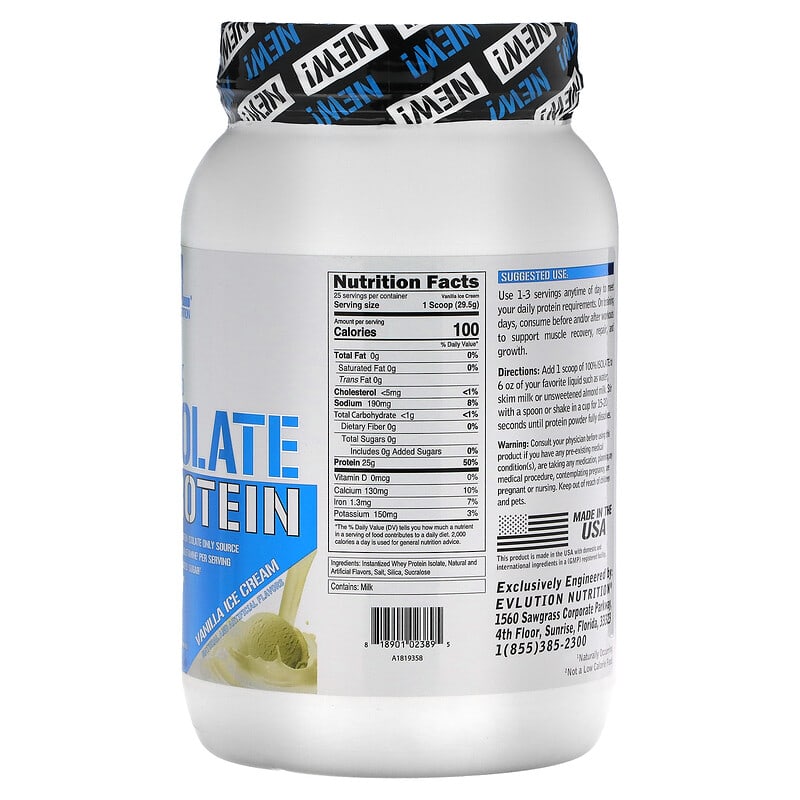
How to Incorporate Whey Protein Isolate
Find practical tips and ideas for incorporating whey protein isolate into your diet. From protein shakes to baked goods, this section provides various recipes and suggestions to help you enjoy the benefits of this supplement.
Whey protein isolate is a popular supplement among athletes, bodybuilders, and fitness enthusiasts. It is known for its high protein content, low lactose levels, and quick absorption rate. Incorporating whey protein isolate into your diet can be beneficial for muscle growth, recovery, and overall health. Here are a few tips on how to incorporate whey protein isolate, considering the calories per scoop:
1. Determine Your Caloric Needs
Before incorporating whey protein isolate into your diet, it's important to know your daily caloric needs. Calculate the calories you require based on your activity level, fitness goals, and body composition. This will help you determine how many scoops of whey protein isolate you should consume.
2. Choose the Right Flavor and Brand
There are various flavors and brands available for whey protein isolate. Choose a flavor that you enjoy, as it will make it easier for you to incorporate it into your daily routine. Additionally, consider the calories per scoop when selecting a brand. Different brands may have slightly different calorie contents, so make sure to check the nutrition facts before purchasing.
3. Add to Smoothies or Shakes
One of the easiest ways to incorporate whey protein isolate is by adding it to your smoothies or shakes. Blend your favorite fruits, vegetables, milk or yogurt, and a scoop of whey protein isolate for a nutritious and protein-packed meal or snack. You can also experiment with different recipes and flavors to keep things interesting.
4. Use in Baking
Whey protein isolate can be a great addition to baked goods. You can replace a portion of the flour in recipes such as muffins, pancakes, or protein bars with whey protein isolate. This adds protein to your favorite treats without compromising taste. Remember to adjust the measurements accordingly to maintain the desired texture and consistency.
5. Make Protein-Packed Oatmeal or Yogurt
Boost the protein content of your breakfast by mixing whey protein isolate into your oatmeal or yogurt. Add a scoop of protein powder and mix well until fully incorporated. This will not only make your meal more filling but also provide your body with the essential amino acids it needs for recovery and muscle growth.
Remember to follow the recommended serving size and guidelines provided by the specific brand of whey protein isolate you choose. Additionally, it's always advisable to consult a healthcare professional or registered dietitian before making any significant changes to your diet.
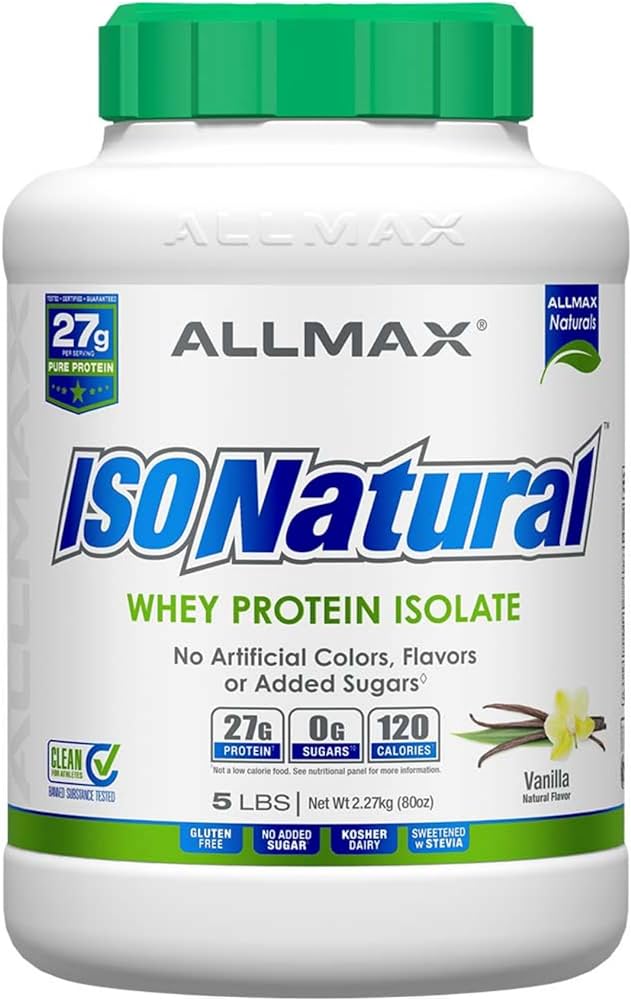
Whey Protein Isolate vs. Whey Protein Concentrate
Discover the differences between whey protein isolate and whey protein concentrate, including their composition, processing methods, and nutritional profiles. Understand which option might be more suitable for your individual needs.
When it comes to choosing the right whey protein supplement, one of the factors to consider is the number of calories per scoop. This plays a significant role in your fitness and nutritional goals. Let's take a closer look at whey protein isolate and whey protein concentrate in terms of their calorie content.
Whey Protein Isolate
Whey protein isolate is a form of protein that undergoes an additional filtration process, resulting in a higher protein content per serving. It typically contains around 90-95% protein with minimal amounts of lactose and fat.
In terms of calories, whey protein isolate generally contains around 100-120 calories per scoop. This low-calorie content makes it an ideal choice for those who are aiming to reduce their overall caloric intake while still obtaining a high-quality source of protein.
Whey Protein Concentrate
Whey protein concentrate is a more economical option compared to whey protein isolate. It goes through a less stringent filtration process and contains a slightly lower protein content per serving, typically ranging from 70-85% protein.
Regarding calories, whey protein concentrate generally contains around 120-150 calories per scoop. This higher caloric content is mainly due to the presence of a small amount of lactose and fat that may not be entirely filtered out during the manufacturing process.
Choosing between whey protein isolate and whey protein concentrate depends on your individual goals and dietary preferences. If you are watching your caloric intake or aiming to reduce fat and lactose consumption, whey protein isolate with its lower calorie content would be a suitable option. However, if cost is a significant consideration, and you don't mind a slightly higher caloric content, whey protein concentrate can be a more affordable choice while still providing a substantial amount of protein.
Remember, the specific calorie content may vary between brands, so it's always recommended to check the nutritional information on the product packaging before making a purchase decision.
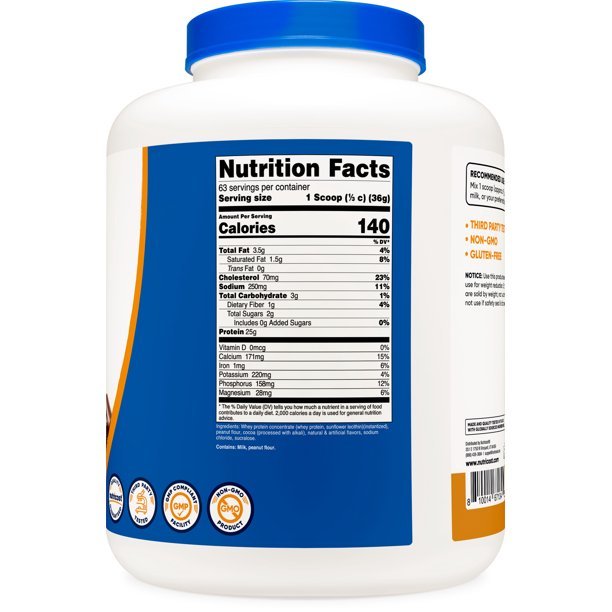
Common Myths and Misconceptions
Debunk popular myths and misconceptions surrounding whey protein isolate. Get accurate information on topics like excessive protein consumption, side effects, and its compatibility with different dietary preferences.
Whey protein isolate is a popular dietary supplement among fitness enthusiasts, but there are several myths and misconceptions regarding its calorie content per scoop. Let's debunk some of these common misunderstandings:
Myth 1: All whey protein isolates have the same calorie count per scoop.
Fact: The calorie count in whey protein isolate can vary depending on the brand and product. It's essential to read the nutritional information on the packaging to determine the exact calorie content per scoop.
Myth 2: Consuming more whey protein isolate leads to more calories.
Fact: The calorie count in whey protein isolate remains constant per scoop, regardless of the quantity consumed. Increasing the serving size doesn't automatically increase the calories. It's crucial to measure the amount of protein powder used to maintain accurate calorie intake.
Myth 3: All flavors of whey protein isolate have the same calorie count.
Fact: Flavored whey protein isolates may contain additional ingredients like sugars, artificial sweeteners, or flavorings, which can slightly affect the calorie count. Always check the nutrition label for the exact calorie content of the specific flavor you are consuming.
Myth 4: Calories from whey protein isolate can hinder weight loss efforts.
Fact: When incorporated into a balanced diet and consumed in moderation, whey protein isolate can be a helpful tool for weight management. It is a low-calorie source of high-quality protein that can aid in muscle recovery, satiety, and supporting an active lifestyle.
Myth 5: Avoiding whey protein isolate altogether reduces calorie intake.
Fact: Eliminating whey protein isolate from your diet solely based on concerns about calorie intake may result in insufficient protein intake. Protein is crucial for muscle repair and growth. Choose an appropriate serving size to meet your nutritional needs while keeping calorie count in check.
In conclusion, it is important to debunk these common myths and misconceptions surrounding the calorie content of whey protein isolate. Remember to always check the nutritional information on the packaging and consult a healthcare professional or registered dietitian for personalized advice regarding protein consumption and calorie management.
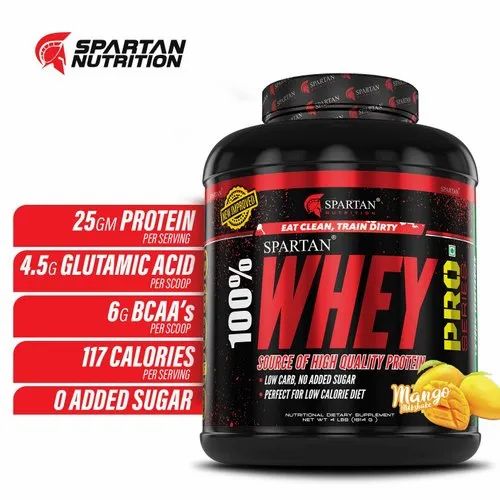
Choosing the Right Whey Protein Isolate
Learn how to choose the right whey protein isolate based on factors such as quality, purity, and manufacturing standards. Understand how to read product labels, identify potential additives, and select a reliable brand.
When it comes to selecting a whey protein isolate, understanding the calories per scoop is crucial. Let's explore why:
Whey protein isolate is a popular choice for athletes and fitness enthusiasts due to its high protein content and minimal carbohydrates and fats. To ensure you make the right choice, paying attention to the calories per scoop is essential.
Calories per scoop provide an indication of the energy value and the number of calories you will consume with each serving. This information is valuable when managing your daily caloric intake and ensuring it aligns with your health and fitness goals.
Keep in mind that different whey protein isolate brands and flavors may vary in their calorie content. It is recommended to check the nutritional label on the product packaging to determine the exact calories per scoop.
If you are looking to lose weight, selecting a whey protein isolate with lower calories per scoop can help you maintain a calorie deficit, promoting fat loss. On the other hand, if your goal is to gain muscle mass or increase overall caloric intake, choosing a product with higher calories per scoop may be more suitable.
Remember that calories alone should not be the sole factor influencing your decision. Evaluating the protein content, carbohydrate and fat composition, as well as considering your dietary needs and preferences, is crucial in selecting the right whey protein isolate.
In conclusion, understanding the calories per scoop is vital when choosing the right whey protein isolate. Make sure to assess your personal goals, preferences, and overall nutritional requirements to find the perfect product that suits your needs.
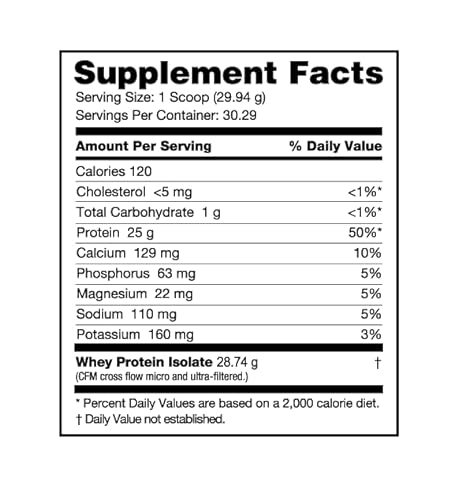
Key Takeaways
- Whey protein isolate is a highly concentrated protein powder.
- It offers numerous benefits, including muscle recovery and immune support.
- Understanding the calories per scoop is essential for managing your daily intake.
- There are various ways to incorporate whey protein isolate into your diet.
- Know the differences between whey protein isolate and concentrate.
- Clear up misconceptions about whey protein isolate.
- Choose a reputable brand based on quality and purity.
FAQ
1. Is whey protein isolate suitable for individuals with lactose intolerance?
Yes, whey protein isolate has a minimal lactose content, making it suitable for most lactose intolerant individuals. However, it is always recommended to consult a healthcare professional if you have any specific concerns.
2. Can I consume whey protein isolate if I am following a vegan or vegetarian diet?
Whey protein isolate is derived from milk, so it is not suitable for those following a strict vegan or vegetarian diet. There are alternative plant-based protein powders available that may better suit your dietary preferences.
3. How many calories are there per scoop of whey protein isolate?
The calorie content may vary depending on the brand and serving size, but on average, a scoop of whey protein isolate contains around 120-140 calories.
4. Can whey protein isolate help with weight loss?
Whey protein isolate can support weight loss when incorporated into a balanced diet and exercise regimen. Its high protein content can help control appetite and promote satiety, making it easier to adhere to a calorie deficit.
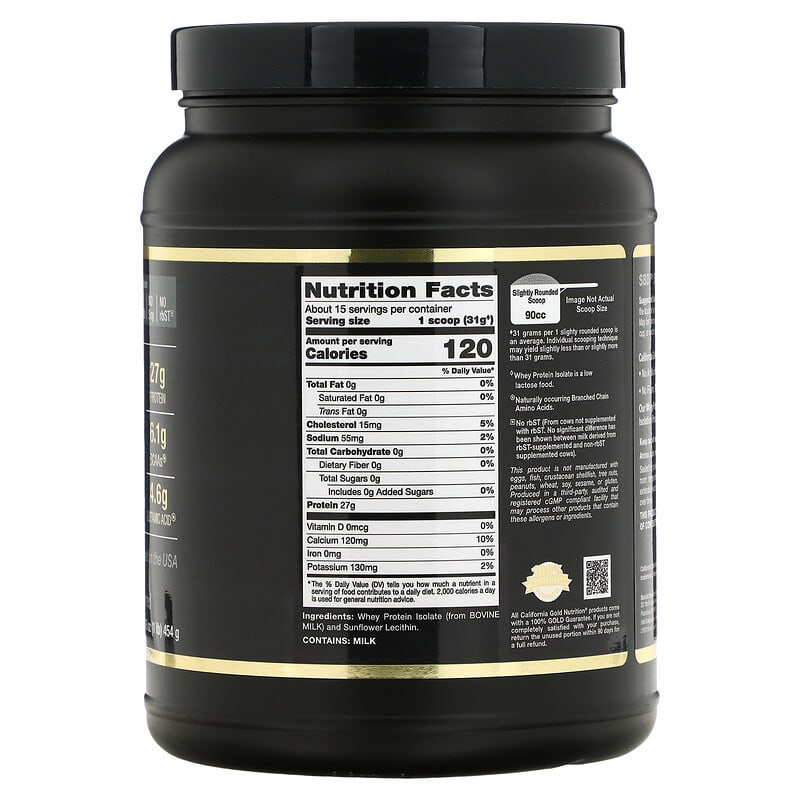


Recent Comments